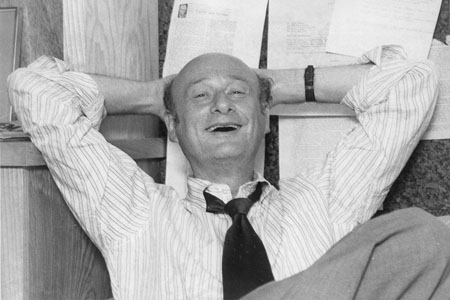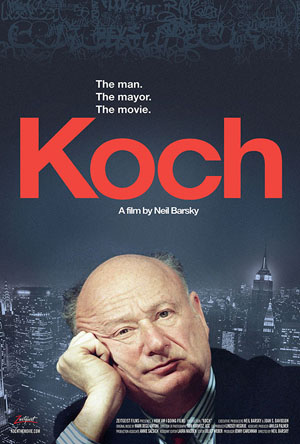“Edward I. Koch, the master showman of City Hall, who parlayed shrewd political instincts and plenty of chutzpah into three tumultuous terms as mayor of New York with all the tenacity, zest and combativeness that personified his city of golden dreams, died Friday morning,” reports Robert D. McFadden in the Times. The cause was congestive heart failure. Koch, who was 88, “had been in relatively good health despite—or perhaps because of—his whirlwind life as a television judge, radio talk-show host, author, law partner, newspaper columnist, movie reviewer, professor, commercial pitchman and political gadfly.”
Eerily enough, Koch, Neil Barsky’s documentary, opens in New York today before rolling out to other cities next month. “It is hardly an uncritical account of Mr. Koch’s dozen years as mayor,” notes the NYT‘s A.O. Scott, “but time has a way of turning the furious political battles of the past into amusing war stories, and of softening old enmities. Politicians, civic leaders and journalists who were thorns in Mr. Koch’s side offer measured, even affectionate assessments of his administration, though some hard feelings persist, especially on matters of race.”
“Love him or hate him, Ed Koch was New York in the 1980s, and Koch’s bio account of his mayoral tenure offers almost equal measures of celebration and censure,” writes Nick Schager in the Voice. “Barsky’s film never shies away from Koch’s controversies, exploring his third term’s devastating corruption scandal and giving voice to critics who viewed him as, among other things, a racist (thanks to his closing of Harlem’s Sydenham Hospital), a hypocritical homophobe (courtesy of persistent rumors of his gayness and his administration’s slow response to the AIDS crisis), and an opportunist. Still, Koch nonetheless also finds time to flirt with hagiography.”
“Once known as ‘America’s mayor,’ Koch would appear to embody just about all of this country’s evils and hypocrisies as well as its potentialities for admittedly remarkable reinvention,” writes Chuck Bowen in Slant. “While a conventional rise-fall-rise story fashioned from a traditional alternation of archive footage and talking-head interviews, Koch is nonetheless fascinating because director Neil Barsky explicitly understands that Koch’s considerable achievements and deplorable embarrassments sprang from precisely the same element of his personality: that larger-than-life, take-no-prisoners bullheadedness that refuses to relent to anyone for any reason. Barsky is surprisingly unsentimental about Koch’s rehabilitation of New York City in the late 1970s throughout the 1980s, as you’re allowed to grasp, from the intimate snatches of vérité footage of his first campaign, that Koch saw Gerald Ford’s infamous refusal to bail the city out as potentially the largest scale dare of his life—an epic pissing contest.”
“The film doubles as a history lesson about, and time capsule of, a transformed metropolis,” writes David Fear in Time Out New York. “There’s a difference between acknowledging controversial actions and truly exploring how they fit into Koch’s overall legacy, and Barsky would much rather flatter than push his subject. The result is neither blind idolatry nor a definitive portrait; just a major missed opportunity content to loiter in the middle of the road.”
But for Noel Murray at the AV Club, “the best scenes in Koch come from the more fly-on-the-wall footage of Koch today. Out on the street, he’s still cheered by some New Yorkers and booed by others, and he’s still willing to argue obstinately with his former constituents, even when he’s supposed to be wooing them for another candidate. In other words, Ed Koch, like politics, remains complicated, and when Barsky shows the ex-mayor bickering with his own family over his public condemnation of the so-called ‘Ground Zero mosque,’ he makes it clear that discontent with even the most likeable politicians is natural, inevitable, and perhaps even essential.”
Updates: Watch Koch review films at The Mayor at the Movies. And: “Ed Koch has been a Pullquote patron saint from before the beginning.” The cinetrix posts a few of his more recent reviews.
New York‘s David Edelstein: “It wasn’t Koch’s fault that New York was broke, that incoming president Ronald Reagan slashed aid to the poor and flooded the streets with the homeless mentally ill, that a mysterious illness—a ‘gay plague’—appeared seemingly from nowhere and quickly killed thousands upon thousands of New Yorkers, that a new, smokable form of cocaine had devastatingly addictive properties that would ravage entire communities. The man Barsky shows us isn’t graceful—but he’s not, like his predecessors, an empty suit or a well-meaning nonentity. Even Koch’s most obstinate critic, former Village Voice reporter Wayne Barrett, testifies to the mayor’s unprecedented overhaul of a crumbling and depleted housing stock…. Whatever your view of its subject, Koch makes for a vital piece of New York history.”
For Time, Lily Rothman‘s gotten in touch with Barsky: “It’s an insane, surreal day. Obviously when you open a film you want attention. You don’t want this kind of attention.”
Updates, 2/3: The New Yorker‘s Hendrik Hertzberg calls Barsky’s doc “vivid, touching, and fair. My own Koch consciousness goes back to the early 1960’s, when Ed Koch was a downtown hero, a Greenwich Village icon on a par with Jane Jacobs, Art d’Lugoff, and Jack Newfield. Koch was the most visible, most audible stalwart of the Village Independent Democrats, the most famous, most rambunctious reform political club in the city. The Village Voice, Newfield’s paper, was practically Koch’s house organ. (Later, as John Cassidy notes, it became his nemesis.) Koch was the guy who had finally taken down Carmine DeSapio, the dark-glasses-wearing, cartoonishly villainous-looking boss of Tammany Hall, by beating him for the Village seat on the Manhattan Democratic county committee…. In recent years, I got to know Koch slightly at a couple of small dinner parties at the Upper West Side apartment of my neighbor Charles Kaiser, the author of The Gay Metropolis, an absorbing history of gay life in America (and, yesterday, of a lovely appreciation of his friend). Face-to-face, it was even harder to dislike Ed Koch. In his (relatively) mellow old age, his sharp wit and unpredictable opinions intact but his malice muted, he was good company.”
Bryce J. Renninger talks with Barsky for Indiewire.
For news and tips throughout the day every day, follow @KeyframeDaily on Twitter and/or the RSS feed. Get Keyframe Daily in your inbox by signing in at fandor.com/daily.





